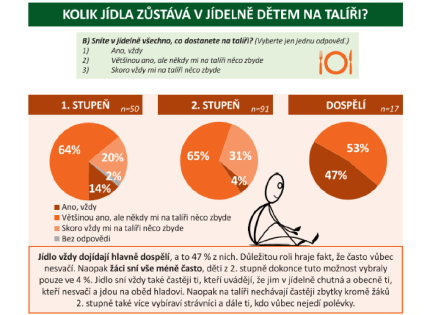School Canteens Research [CZ]
News, 1 Feb 2018, Prague
In 2017 we started an in-depth research at few selected primary schools in the Czech Republic to see what can be done about food waste there. School canteens are already trying to be economical, yet we inquired into possible further food waste prevention. In order to get a full picture we combined daily weighing of food surplus, the menu, quantitative questionnaires detailing user's (mainly pupils) eating habits and preferences, and a qualitative moderated discussion to also hear what numbers do not convey. Results showed us for instance a role of snacking or children not understanding certain names of the dishes in the menu. We are going through the findings with school representatives now. Later we are going to pair canteen's effort to minimize food waste with education about food waste in classes.
The method of the research
In 2017 Glopolis began a detailed research at selected primary schools to discover the origins and reasons for food waste in school canteens. The research was divided into three parts:
1. Questionnaires for teachers and pupils who eat in the school canteen.
2. An in-depth discussion with representatives of pupils, teachers and canteen staff. The whole process of eating, the preferences and the problems they face were explored. A professional presenter from the research center led a discussion to create the most pleasant atmosphere so that children can express their opinions without fear.
3. Weighing of the food leftovers in school canteen for at least 1 month.
The result of the research is a complete picture of the problem of food waste at selected schools and recommendations on how to work with the results. It is not just a statement of the situation but above all a proposal for possible solutions.

Example of one research finding
Recommendations to schools
1. Communicate with parents – Not only with children but especially with parents. If a child brings a big snack and eats it right before lunch, we can not expect them to be hungry and consequently the prepaid meal is wasted.
2. School's buffet role - It is important for the buffet to be complementary, it should not replace a function of lunch.
3. Customize portions – Smaller portions with the possibility to ask for more later is a good prevention.
4. Serve soup only on demand – When ordering lunch, there could be an option for child (or parents) to not order the soup. This could reduce the canteen costs too.
5. Personal contact – A person who serves the lunch to children plays an important role. If children are not comfortable in the canteen environment, the food waste factor is increased.
6. Stress and Noise Factor – Stressful and noisy environment has a negative effect on eating. This is true for both children and adults. If uncomfortable, people do not enjoy their food and therefore have a tendency to return the meal.
7. Create a story – Thematic days or weeks are proven to bring fun and excitement into canteen. Children and adults have the opportunity to explore other types of cuisine. They will be more involved in the eating experience and mindful about the meals orders if they know that there is an interesting change in the menu.
Special thanks to the participating schools
- Primary School Navis
- Primary School Jílové u Prahy
- Primary School Zbiroh
